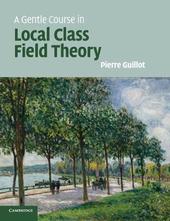
|
A Gentle Course in Local Class Field Theory: Local Number Fields, Brauer Groups, Galois Cohomology
Paperback / softback
Main Details
| Title |
A Gentle Course in Local Class Field Theory: Local Number Fields, Brauer Groups, Galois Cohomology
|
| Authors and Contributors |
By (author) Pierre Guillot
|
| Physical Properties |
| Format:Paperback / softback | | Pages:306 | | Dimensions(mm): Height 247,Width 174 |
|
| Category/Genre | Algebra |
|---|
| ISBN/Barcode |
9781108432245
|
| Classifications | Dewey:512.32 |
|---|
| Audience | | Undergraduate | | Postgraduate, Research & Scholarly | |
|---|
| Illustrations |
Worked examples or Exercises
|
|
Publishing Details |
| Publisher |
Cambridge University Press
|
| Imprint |
Cambridge University Press
|
| Publication Date |
1 November 2018 |
| Publication Country |
United Kingdom
|
Description
This book offers a self-contained exposition of local class field theory, serving as a second course on Galois theory. It opens with a discussion of several fundamental topics in algebra, such as profinite groups, p-adic fields, semisimple algebras and their modules, and homological algebra with the example of group cohomology. The book culminates with the description of the abelian extensions of local number fields, as well as the celebrated Kronecker-Weber theory, in both the local and global cases. The material will find use across disciplines, including number theory, representation theory, algebraic geometry, and algebraic topology. Written for beginning graduate students and advanced undergraduates, this book can be used in the classroom or for independent study.
Author Biography
Pierre Guillot is a lecturer at the Universite de Strasbourg and a researcher at the Institut de Recherche Mathematique Avancee (IRMA). He has authored numerous research papers in the areas of algebraic geometry, algebraic topology, quantum algebra, knot theory, combinatorics, the theory of Grothendieck's dessins d'enfants, and Galois cohomology.
Reviews'This masterly written introductory course in number theory and Galois cohomology fills a gap in the literature. Readers will find a complete and nevertheless very accessible treatment of local class field theory and, along the way, comprehensive introductions to topics of independent interest such as Brauer groups or Galois cohomology. Pierre Guillot's book succeeds at presenting these topics in remarkable depth while avoiding the pitfalls of maximal generality. Undoubtedly a precious resource for students of Galois theory.' Olivier Wittenberg, Ecole normale superieure 'Class field theory, and the ingredients of its proofs (e.g. Galois Cohomology and Brauer groups), are cornerstones of modern algebra and number theory. This excellent book provides a clear introduction, with a very thorough treatment of background material and an abundance of exercises. This is an exciting and indispensable book to anyone who works in this field.' David Zureick-Brown, Emory University, Georgia 'The title intrigues! How could anyone possibly introduce class field theory (local or global) gently? ... If one can't reasonably expect any author to anticipate and answer all the questions an expert teacher might field, Guillot comes as close as one might hope. Even theoretical courses need a goal, and this one culminates with the landmark Kronecker-Weber theorems, both local and global, characterizing all the abelian extensions of p-adic fields and of the rationals, respectively.' D. V. Feldman, Choice 'Even if the book is conceived primarily for graduate students and young researchers who meet these topics for the first time, the beauty of the matter and the way it is presented, the 'narration', and (last but not least) the style of the author make the reading of the book a pleasure also for mathematicians who want to review some class field theory.' Claudio Quadrelli, MathSciNet 'True to its title, this book is more accessible than the standard works on local class field theory.' Kevin Keating, zbMATH '... a valuable book. I certainly cannot think of any other source that makes the basic ideas of class field theory, and the Kronecker-Weber theorems, more accessible. And the background material on noncommutative algebra and group cohomology can be read with profit by somebody just interested in these topics alone. Highly recommended.' Mark Hunacek, The Mathematical Gazette
|